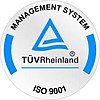Technischer Überwachungsverein

TÜVs (short for Technischer Überwachungs-Verein, Technical Monitoring Association in English) are German organizations that work to validate the safety of products of all kinds to protect humans and the environment against hazards. As an independent consultant, they examine monitoring-needy plants, motor vehicles, energy installations, devices and products (e.g consumer goods). The many subsidiaries of the TÜVs can also appear as project developers for energy and traffic concepts, problem solutions in the area of environmental protection and as certification bodies. Many of the TÜV organizations also provide registration to various standards such as, ISO9001:2000 quality management system and ISO/TS16949 automotive quality management system.
The TÜVs as a group became part of the German landscape about 130 years ago, as part of the public and workplace safety initiatives of the time. In and around 1870 there were 43 TÜVs in total. They were geographically based as they are today, hence the names, SÜD, NORD, Rheinland, etc. The TÜVs were originally formed to inspect steam boiler installations across the country. Interestingly enough, TÜV SÜD still has a large portion of its business rooted in the inspection and certification of boiler and pressure equipment (see the Pressure Equipment Directive for more). As the years and technology rolled along, the 43 TÜVs merged and now there are 4 TÜVs remaining. TÜV SÜD, NORD, RW, and Rheinland. The largest is the SÜD group with 11,000 employees and 600 locations worldwide. The only other certification body in the world larger than TÜV SÜD is Société Générale de Surveillance, based in Switzerland.
No German-registered road vehicle may be operated on public roads without a certificate from the TÜVs or Dekra, one of their competitors. In most cases the certificate has to be renewed after two years. A pass of the mandatory roadworthiness and smog test is indicated by tamper-proof decals on the license plate. Most modifications also need to be approved, from installing tires of a different size to materials used in nuts and bolts. The TÜV's safety guidelines are among the strictest in the world, and getting a road permit for thoroughly customized vehicles is said to border on the impossible.
Some of the TÜVs are also recognized/authorized to certify products for various countries such as United States, the TÜV SÜD America - TUVus mark (equivalent listing as for example UL Mark), Argentina or Japan (e.g. according to DENAN/PAL law). The TUV SUD America cTUVus Mark is equivalent to a CSA or UL North American Mark. The "c" stands for Canada and the "us" stands for USA. TÜV also offers access to more markets than most other notified bodies/certification bodies.
For global market access those TÜVs might support with their global presence for example by local testing or to apply to the relevant ministries of the behalf of the manufacturers utilizing existing test reports (IECEE CB scheme). The TÜVs as a group are also the world's largest overall product certification organizations.
TÜV Süd
TÜV Süd has its headquarters in Munich. A merge with TÜV Rheinland is being prepared, [1][2], but the name of the new company has not yet been determined.
TÜV Süd currently has 11,000 Employees and reached in 2006 a gross income of 1.2 billion Euro.
See also
External links
Various TUV Websites
- http://www.tuv.com/ TÜV Rheinland Group
- http://www.tuv.be/ TÜV Rheinland Belgium
- http://www.tuev-sued.de/en/ TÜV SÜD Global Head Office (SUD)
- http://www.tuev-nord.de/ TÜV Nord Gruppe
- http://www.tuv.com.tr/ TÜV Thüringen Turkey
- ^ Gemeinsame Pressekonferenz vom 13.02.2008 mit Video
- ^ TÜV Rheinland und Tüv SÜD wollen gemeinsam den internationalen Markt erobern. Auch nach dem geplanten Zusammenschluss der beiden Prüfinstitute soll der Standort Köln erhalten bleiben
